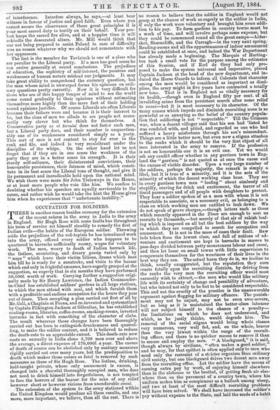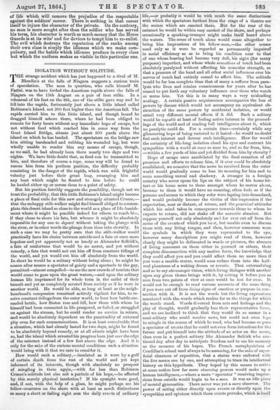OCCUPATION FOR SOLDIERS.
THERE is another reason besides economy for the extension of the recent reform in the army in India to the army in England. Sir Hugh Rose with some faults has throughout his term of service set himself steadily to remedy the first of Indian evils—the habits of the European soldier. Throwing aside the prejudices of the red-tapists he has introduced work into the army, offered every soldier who happens to be quartered in barracks sufficiently roomy, wages for voluntary work. The men, weary to death of Indian barrack life, the listless, sauntering, and dreary gossip varied only by -" naps" which leave their victim bilious, drams which heat him till he is ready for a sunstroke, and visits to the bazaar which end only in frightful excesses, have eagerly grasped at the suggestion, so eagerly that in six months they have performed 50,000/. worth of work. Carrying further a suggestion origi- nally made by Sir Henry Lawrence, the Indian Commander- in-Chief has established soldiers' gardens in all large stations, to which the men attend with zeal, and which furnish them with a profitable and endless occupation for the hours they pass out of doors. Then accepting a plan carried out first of all by Mr. Gell, a Chaplain at Poona, and re-invented and systematized by Captain Pilkington Jackson at Gibraltar, he has established reading-rooms, libraries, coffee-rooms, smoking-rooms, invested barracks in fact with something of the character of clubs. The result wherever these changes have been thoroughly carried out has been to extinguish drunkenness and quarrel- ling, to make the soldier content, and it is believed to reduce the death-rate to an appreciable extent. This death-rate now costs us annually in India alone 3,700 men over and above the average, a direct expense of 370,000/. a year. The causes of death of course can be abolished only by sanitary measures rigidly carried out over many years, but the predisposition to death which makes those causes so fatal is removed by such measures as those of Sir Hugh Rose. The listless, drinking, half-taught private, whose only amusement is excess, is changed into a cheerful thoroughly occupied man, who does not need to drink himself into forgetfulness, is not tempted to face the horrors of the bazaar for the sake of any relief however short or however vicious from unendurable ennui.
The extension of the system to the army stationed within the United Kingdom would produce all these results, and one more, more important, we believe, than all the rest. There is
no reason to believe that the soldier in England would not grasp at the chance of work as eagerly as the soldier in India, if only the work were voluntary and brought him some addi- tion to his pay. To form gardens in country towns must be a work of time, and will involve perhaps some expense, but they could be commenced round all the great camps—Alder- shot, Shorncliffe, and the Curragh—in the very next spring. Reading-rooms and all the appurtenances of indoor amusement could be established at once, and indeed the War Department has already made a beginning. The Marquis of Harting- ton took a small vote for the purpose among the estimates of this Session, and if Earl de Grey had only pro- posed to make the system universal and imperative, placed Captain Jackson at the head of the new department, and in- duced the Horse Guards to inform all Colonels that character among the men would be considered as important as disci- pline, the army might in five years have contracted a totally new tone. That is in England not so vitally necessary for its health,—though even in England fifty per cent. of all invaliding arises from the persistent search after some relief to ennui—but it is most necessary to its character. Of the many causes which impede and diminish recruiting none is so powerful or so annoying as the belief of the country popula- tion that soldiering is not 'respectable." Till the Crimean war, when a decent villager said that his son had 'listed he was condoled with, and pitied, and regarded as one who had suffered a heavy misfortune through his son's misconduct. Things are a little better now, but even now a stigma attaches to the ranks which it should be the very first object of all men interested in the army to remove. If the profession is not an honourable one it is an evil one. Yet we would ask any candid officer whether in any garrison town in Eng- land the " garrison" is not quoted as at once the cause and the excuse of visible disorder. Upon a very large number of the soldiers, perhaps the majority, the remark is simply a libel, but it is true of a minority, and it is the acts of the minority of which the decent working class hear. They see in every garrison town men " loafing " about aimlessly and stupidly, craving for drink and excitement, the terror of all timid passengers and of all people with daughters to protect. They hear a soldier spoken of as a man with whom it is not respectable to associate, as a necessary evil, as belonging to a class on which working men are entitled to look down. We do not speak of grave charges,—though letters such as those which recently appeared in the Times are enough to cost us recruits by thousands,—but merely of that air of rakish loaf- ing which is imposed on all but the best soldiers by the way in which they are compelled to search for occupation and amusement. It is not in the mass of cases their fault. Raw lads taken from the lowest class, and full of notions of ad- venture and excitement are kept in barracks in masses to pass days divided between petty monotonous labour and ennui, and then let loose on small towns with little supervision to compensate themselves for the weariness of their lives in the best way they can. The actual harm they do is, we incline to think, usually exaggerated, but the reputation they earn reacts fatally upon the recruiting districts, by driving from the ranks the very men the recruiting officer would most earnestly wish to attract,—the men who would like military life with its certainty of change and possibility of adventure, but who intend not only to be but to be considered respectable. This and not the cruelty of the practice is the unanswerable argument against flogging for military offences. The punish- ment may not be unjust, may not be even over-severe, but so long as it is maintained the better-class labourer will not subject himself to the chance of a penalty the limitations on which he does not understand, and which, as he justly thinks, would degrade him. The removal of the social stigma would bring whole classes very numerous, very well fed, and, on the whole, braver than the very lowest within the range of the recruit- ing officer, and there is no quicker means to remove it than to amuse and employ the men. "A blackguard," it is said, though always by civilians, "often makes a good soldier," and he may, for that epithet is often applied only to men who need only the restraint of a stricter organism than ordinary civil society, but one blackguard drives two decent men away from the recruiting office. Let the soldier have the means of earning extra pay by work, of enjoying himself elsewhere than in the alehouse or the brothel, of getting fresh air else- where than on the pavement of a country town, where his uniform makes him as conspicuous as a bullock among sheep, and two at least of the most difficult recruiting problems will have been solved. We shall have increased the soldier's pay without expense to the State, and laid the seeds of a habit
of life which will remove the prejudice of the respectable against the soldiers' career. There is nothing in that career itself to injure the character of the private. On the contrary, no man is more sought after than the soldier who has served his term, his character is worth so much money that the Horse Guards is at its wits' end for devices to tempt him to re-enlist. The evil which destroys the reputation of the ranks among their own class is simply the idleness which we make com- pulsory, and the habits which idleness produce in every class but which the uniform makes so visible in this particular one.































 Previous page
Previous page